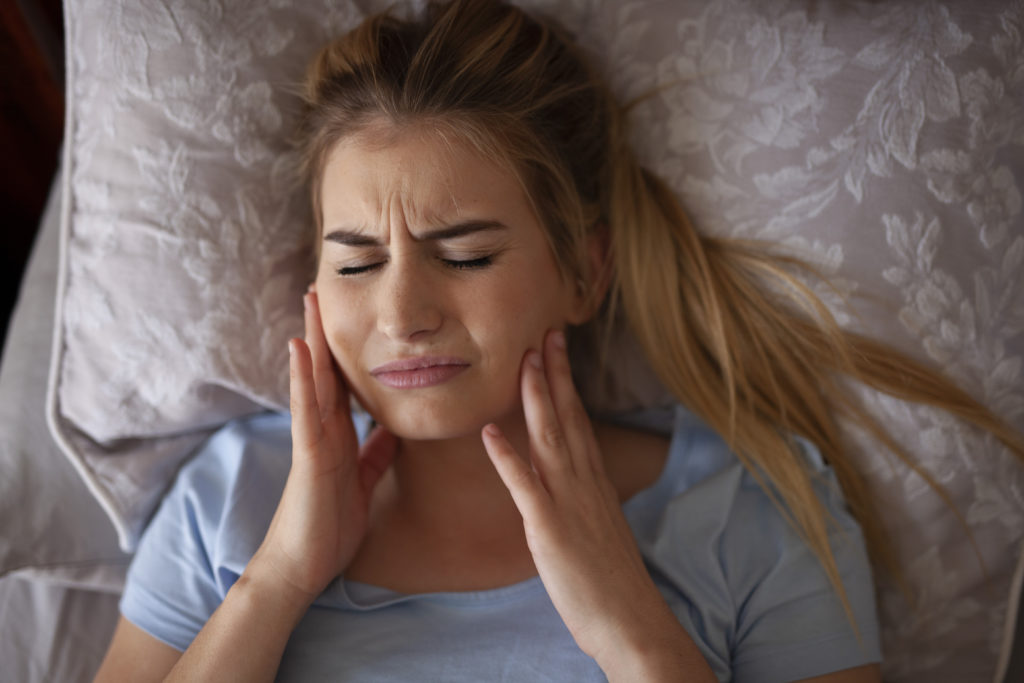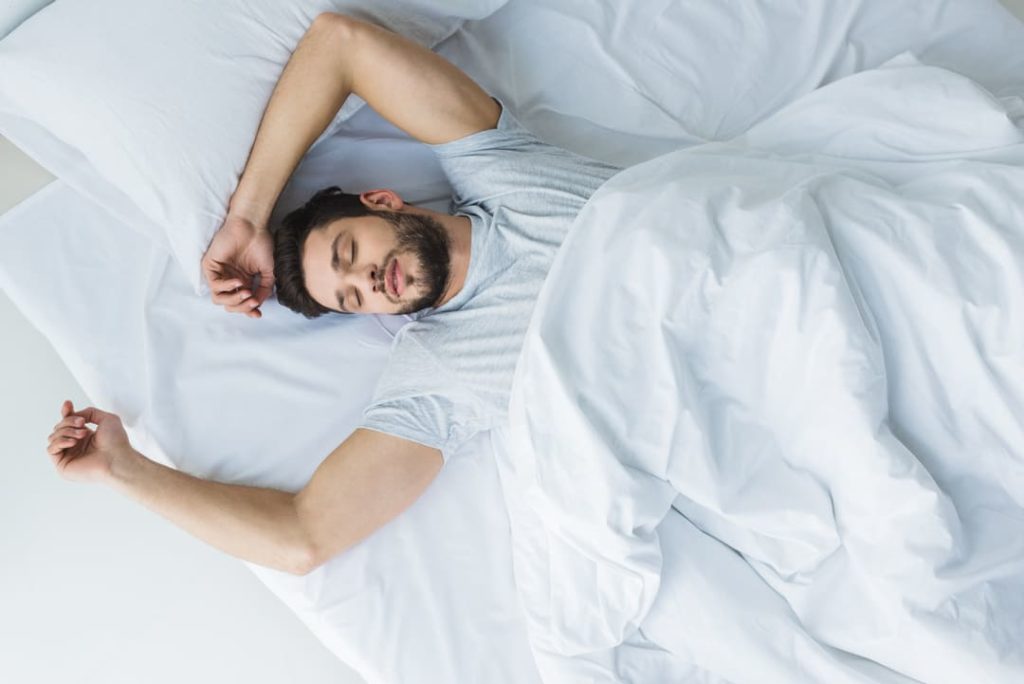Teeth grinding and clenching is a common instinctive reaction to stress, fear, or anger. In some cases, this reaction frequently strikes through the day, even if they aren’t experiencing an immediate stressful episode. This involuntary teeth-grinding response is scientifically known as bruxism.
Bruxism can occur while awake or sleeping, although people are much less aware that they grind their teeth when sleeping. Because of the intensity applied and consistency during sleep bruxism episodes, the condition can cause severe teeth and jaw problems. In some cases, it may require treatment to reduce its consequence.
Symptoms of Sleep Bruxism

The primary sign of sleep bruxism is uncontrolled clenching and grinding teeth at night. It feels as if you’re chewing but with more force involved.
Contrary to popular belief, individuals with sleep bruxism don’t chew on their teeth throughout the night. These happen in episodes of clenching and grinding. In most cases, people have very few episodes per night or, in extreme cases, up to 100. The recurrence of these episodes is somewhat inconsistent; some nights, it may not happen at all.
It’s common for people who suffer from bruxism not to be aware of these episodes unless they are told about it. Other symptoms can be an indication of sleep bruxism. Jaw ache and neck pain are two common signs of bruxism.
These occur because of the tightening of the surrounding muscles during these teeth grinding episodes. Morning headaches are another likely symptom of bruxism.
Consequences of Sleep Bruxism
Not everyone who suffers from sleep bruxism will have profound impacts. The intensity of the symptoms and long-term consequences will depend on the severity of the grinding. Long-term implications of unaddressed sleep bruxism can include significant damage to the teeth. Teeth may become eroded and loose. It can also impact fillings, dental crowns, and implants.
Bruxism can put at risk the joint that connects the lower jaw to the rest of the skull, known as the temporomandibular joint (TMJ). TMJ complications can involve difficulty chewing, sustained jaw pain, popping or snapping noises, locking of the jaw, and more.
What Causes Sleep Bruxism?
Various factors influence sleep bruxism’s uncertainty, so it’s usually very hard for people to identify one cause for why they grind their teeth. Certain risk factors are linked to a greater probability of sleep bruxism.
Stress is one of the most notable of these factors. When faced with challenging situations, grinding the teeth is a natural reaction that can carry over to sleep bruxism episodes. Teeth grinding is also believed to be connected to higher levels of anxiety. Furthermore, researchers have discovered that sleep bruxism has a genetic element and can run in families.
Cigarette smoking, alcohol consumption, caffeine intake, depression, and snoring are all associated with sleep bruxism. Further investigation is needed to fully understand potential causal associations on how these factors influence sleep bruxism.
How to Stop Grinding Teeth
No treatment can completely eradicate or rectify teeth grinding because it falls into the involuntary movement category. However, several methods can help decrease these grinding episodes to limit damage to the teeth and jaw.
Some people with bruxism may have no other symptoms and may not need treatment at all. Other people may be more at risk of long-term consequences. In these extreme cases, treatment is usually required.
The best treatments for this kind of condition vary based on the individual. They should always be supervised by a dentist or doctor who can go over the therapy’s advantages and downsides.
Reducing Stress
Since high levels of stress contribute to bruxism when awake and sleeping, taking actions to manage stressors in your life may naturally decrease the teeth’ clenching and grinding.
Distancing yourself from stressful situations is always ideal; however, it’s impossible to completely eliminate stressful situations when you’re part of a moving world. To help solve this, many approaches focus on fighting adverse responses to stress to lessen its impact.
Methods for combating negative thoughts involve cognitive-behavioral therapy for insomnia (CBT-I), a talk therapy aimed at improving sleep, anxiety, and stress. Improving sleep hygiene and exercising relaxation techniques can have tremendous benefits against bruxism.
Medications
In some cases, medications can help reduce sleep bruxism in some people. Most of these medications work by reconstructing brain chemicals to lessen muscle activity involved during teeth grinding. Botox injection is another way of restricting muscle movement and has proven quite beneficial in more severe cases.
Unfortunately, most of these medications come with side effects that may make them unsuitable for some patients to use long-term. That said, it is essential to talk to a doctor before committing to any treatment for sleep bruxism.
Mouthpieces

Mouthpieces (or night guards, dental splints) are also useful in managing sleep bruxism. Nightguards can reduce damage to the teeth and mouth that can occur when the grinding starts.
Dental splints are designed to cover the teeth so that there is a barrier against grinding’s harmful impact. They can cover just a section of teeth or a wider area, such as the whole upper or lower teeth, for added protection.
Other varieties of mouthpieces, including mandibular advancement devices (MAD), work to support the mouth and jaw in a specific position to prevent grinding from happening. These devices work by locking the lower jaw forward to limit movement, and they are generally used to manage chronic snoring.
Lifestyle Relief
Another part of a potential treatment is reducing symptoms to better manage sleep bruxism.
Avoid chewing gum or hard foods to cut down on jaw movements. Apply a hot compress or ice pack to the jaw to provide temporary relief.
Facial-focused exercises have proved useful for some people to reduce the pain in their jaw or neck. Your dentist may suggest specific exercises or recommend you to a qualified massage therapist or physical therapist.
Takeaway
While there is no cure for sleep bruxism, there are some steps you can take to cope with it. Stress management may help reduce or prevent signs of bruxism in people who are prone to it. Good pre-bed routine and sleep hygiene are other excellent ways to manage the condition.
Other suggestions include sleeping on the side or stomach and getting plenty of exercise during the day.



28 Replies to “How to Stop Grinding Your Teeth in Your Sleep”
Bu yazıyı okumak benim için bir keyif oldu. Yazarın sıcak ve samimi üslubuyla konuya olan ilgisi belli ki çok yüksek. Teşekkürler! | Gülsuyu Mahallesi, Maltepe Koltuk Yıkama
Kate Hudson | Your blog is a treasure trove of wisdom, waiting to be discovered by those seeking enlightenment.
Venster Systems’ retractable insect screens not only protect us from insects but also add to the decoration of our home. | Pileli Sineklik Fiyatları Diyarbakır